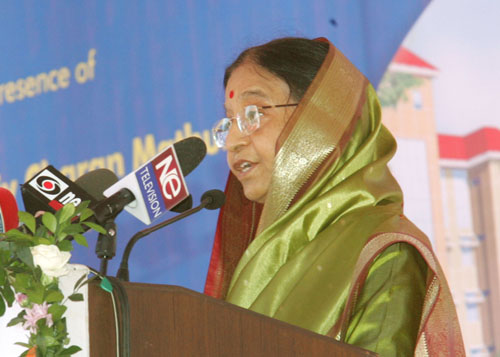Speech by the President of India, Smt. Pratibha Devisingh Patil, at the Foundation Stone Laying Ceremony of the Tezpur Medical College
Tezpur, Assam : 21.10.2008

Ladies and Gentlemen,
It is, indeed, a pleasure to be here today on the occasion of the Foundation Stone Laying Ceremony of the Tezpur Medical College.
Tezpur is an ancient city with a rich tradition of art, culture and nationalism. Many from here participated in the freedom struggle and sacrificed their lives for our independence during the Quit India Movement of 1942. I would like to pay homage to them.
The lush green valleys of Tezpur have given it a rare scenic beauty that has attracted many travelers and impressed them. I too am impressed and would like to convey my greetings to the warm and friendly people of Assam. For me, the North East region has always been of special interest and I was looking forward to my visit here.
Located close to Arunachal Pradesh, this city is well placed to serve the people of not only Assam, but also the region beyond. Thus any economic development in Tezpur will have positive fallouts in surrounding areas as well. A new medical college in such an environment shall be a great boon to a large number of people. I am told that the Tezpur Medical College has been envisioned as an advanced, modern, state of the art institution that will impart quality medical education at all levels. When it begins functioning will be able to cater to patients from Arunachal Pradesh as well as the neighbouring districts of Sonitpur, Darrang, Nagaon, Dhemaji and Lakhimpur. I understand that this will be the first medical facility on the North bank of the mighty Brahmaputra River.
There is an urgent need for augmenting medical institutions in our country. We have 271 medical colleges all over the country out of which about 31,000 medical graduates pass out every year. Healthcare professionals form the backbone of the medical system in the country and having enough number of skilled medical personnel is essential for making affordable medical facilities available to all. But presently their number remains inadequate and is reflected in the extremely low doctor to patient ratio, especially so in rural India, as compared to global standards. We, therefore, need many more doctors and many more institutions. The decision of the Government of Assam to establish the medical college is a step in the right direction, and I congratulate the Government of Assam in making the decision and choosing the right place.
The education system in our country should not only produce capable doctors but also sensitize them to national efforts to provide healthcare to all. A very important aspect of medical education is the internship phase. It is in this period when theoretical knowledge is put into practice and students are made aware of the needs of community health. I have always encouraged medical institutions to look at the possibility of sending medical students to villages for training. They can also help in the creation of health workers in the villages by giving them training on basic medical skills and first aid treatment.
In a scheme started in Parinche village of Pune District in Maharashtra in collaboration with the National Institute of Open Schooling, women villagers from different communities who have studied till middle school are given training for providing basic medical help to villagers. Trained doctors are always available to these women on walkie-talkies in case they need advice. In serious cases trained doctors are also sent to attend to the patient if required. The overall effect has been an improvement in the social atmosphere and resolution of village problems. This is what India needs.
I understand that the Indian Medical Association has taken a good initiative to adopt about six hundred villages under its project for taking the medical fraternity to the villages. I often point out that 75 percent of our medical facilities are located in urban centres while 70 percent of our population lives in villages where the medical facilities are limited and often located some distance away. To address this, the Government of India has schemes like the National Rural Health Mission, but their success depends upon the willingness of health professionals to contribute to this endeavour. I am told that here also there is a deficiency of qualified doctors in many rural health institutions. I call on medical institutions already existing in Assam and doctors to see how they can serve rural communities. In addition, encouragement should be given to traditional medicines and indigenous knowledge. Systematic studies and research need to be undertaken into these age old systems of medicine also.
To keep high standards doctors should look at following the highest standards of ethics. It must never be forgotten that a doctor's profession is service to humanity and actions that demonstrate such a commitment earn respect for the profession. The medical profession is a profession of giving. It is a profession where, for the patient a good doctor becomes not only an aid-giver but also a friend. For a doctor, a sense of compassion is as important as professional and technical skills. Making affordable healthcare available should be the future direction of the medical world.
Medical institutions, doctors and paramedics contribute to improving health parameters of a society. Healthy citizens make a healthy nation. The North Eastern States with their potential for progress would definitely benefit from having healthy citizens, who can ignite economic growth in this region.
I have no doubt that our doctor community has the capacity to serve. I would call on all present here to work for creating a society that is equitable, progressive and one which promotes excellence in human endeavour.
I wish all success to the State government in its efforts to bring the benefits of medicine to the people.
Thank You,
Jai Hind
